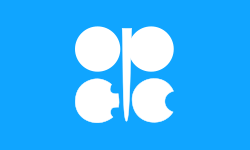OPEC
international organization of petroleum-exporting countries From Wikipedia, the free encyclopedia
Remove ads
OPEC, the Organization of the Petroleum Exporting Countries is an international organization. Since 1965, the headquarters of OPEC has been in Vienna, Austria. OPEC was established in Baghdad, Iraq on 10–14 September 1960.[4]
Its work is to "coordinate and unify the petroleum policies" of its members, and also to "ensure the stabilization of oil markets in order to secure an efficient, economic and regular supply of petroleum to consumers, a steady income to producers, and a fair return on capital for those investing in the petroleum industry".[5][6][7][8]
According to the United States Department of Energy Energy Information Administration (EIA), OPEC crude oil production is an important factor affecting global oil prices. OPEC sets production targets for its member nations and generally, when OPEC production targets are reduced, oil prices increase.[9] Projections of changes in Saudi production result in changes in the price of crude oil.[9]
OPEC was formed in 1960 when the international oil market was largely dominated by multinational companies known as the 'seven sisters'.[10]: 503 The formation of OPEC was a turning point in state control over natural resources.[10]: 505 In the 1960s OPEC made sure that oil companies could not unilaterally cut prices.[10]: 505 In December 2014, OPEC and the oil men were named in the top 10 most influential people in the shipping industry by Lloyds.[11]
Remove ads
Members
21 countries are members of OPEC.[12] The names of these countries are:
- Algeria
- Angola
- Austria
- Bahrain
- Benin
- Brunei Darussalam
- Cameroon
- Congo
- Ecuador
- Equatorial Guinea
- Gabon
- Iran
- Iraq
- Kuwait
- Libya
- Nigeria
- Oman
- Saudi Arabia
- Syria
- The United Arab Emirates
- Venezuela.
Indonesia and Qatar are former members.
Aims
Member countries of the OPEC came together to form this international organization with several aims. Some of the aims are:
- To protect the interest of the member countries.
- To make sure that the price of petroleum products do not change much.
- To make certain a regular supply of petroleum oil to other countries.
- To make sure that member countries get the right amount of money from sale of oil products.
- To decide policies to follow relating to production and sale of petroleum oil.
However, OPEC has not always been able to achieve all these aims.
Remove ads
Related pages
- Organization of Arab Petroleum Exporting Countries
- 1973 oil crisis
- Cartel
References
Other websites
Wikiwand - on
Seamless Wikipedia browsing. On steroids.
Remove ads


